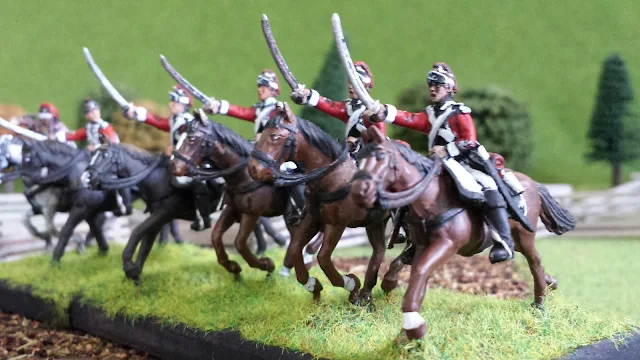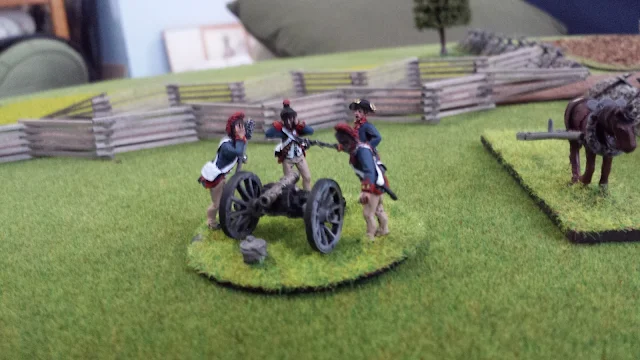Saturday, July 1, 2017
Sumter and Pickens
I have also done a couple command figures for my militia brigades. These represent Generals Sumter and Pickens. Both men were very different in command styles and personality. But both did an incredible amount to keep the rebellion alive at its darkest time in South Carolina.
Sumter, nicknamed "The Carolina Gamecock" was more dramatic and more impulsive. He gave as good as he got on the battlefield but at times was very easy with his men's lives. Pickens on the other hand cooperated with the continental officers better and was very protective of his men's lives. One friend said this taciturn individual was so silent he spoke only after he thought over what he would say and then took the words out of his mouth, examined them and then spoke.
They are very nicely done figures that painted up quickly. The hunting shirt wearing officer represents Sumter while Pickens is in his continental line uniform. Miniatures from Fife and Drum.
Friday, June 23, 2017
Club game night
 |
| How does this thing work? |
I want to start this by thanking Ed for the generous use of his pictures from his blog. While I did take some pictures, I deleted them in error! I have a problem with technology. He kindly came to my rescue and offered the use of his pictures. So all pictures in this posting are from his blog. Thank you Ed! Now on to the story.......
Friday was club game night at the Northern Conspiracy club. I participated as a guest of Ed from Ed's Meandering War games ( http://edmwargamemeanderings.blogspot.com) . As is usually a wonderful time was held by all and great games were put on in three decades different time periods. Interestingly all three were in 25mm ( or is it now 28mm?) Scale. In my past 15mm were very popular but now it's 25mm. Due to age or eye sight?
Charlie put on a striking Napoleonic game played to his rules. A beautiful army of Austrians vs French. Great looking figures on a wonderfully terrain table. As Ed played in this game I would suggest a trip to his blog for a write-up of the details. But from across the room it looked like all were having fun.
AJ, from AJ's blog (http://ajs-wargaming.blogspot.com) put on a interesting and fast paced WW2 action. The rules were I believe Iron cross. I am not a big player for modern type games but it did look interesting and is with all of AJ's games had incredible beautiful terrain and equally beautiful figures. Please see his blog for a write up.
I played in Peter's game. This saw the British in the Sudan vs the Madhi. A column of troops had to March across the blazing sands to relieve a city (rescue Gordon?). Naturally the forces of the Mahdi were there to stop them. Rules used were "800 Fighting Englishmen" and figures were 25mm. It was a fun low stress game and my fellow players Mike, Don and John kept it light hearted and fun.
I was on the British side and commanded the infantry (4 battalions) a screw gun and three Gardner guns. John took the hussars and camel corp (Guard Camel Corp old boy). Although we were supposed to March across the table the Madhi and his forces came to us. Mike threw waves of cavalry and infantry against me. I formed line and with a clear field of fire mowed down the enemy to my front. John and Don engaged in an epic mounted battle with every mounted unit thrown at the Guards Camel Corp being routed back! The Corp was finally done in by advancing across the dervish front and being surprised by hidden units. At this point the game ended as although the British done well, they had gotten no where near the city. Poor Gordon was not to be rescued yet again.
A very fun night was had by all.
Thursday, June 22, 2017
Hunting shirt infantry
Most of my American regulars are in standard uniforms. But nothing says Rev War like figures in hunting shirts so I just had to paint some. And I must say they were great fun to paint! So much so that I intend on doing another regiment like it.
These figures represented continental or state line infantry. They could also stand in as militia. So this is a very useful regiment. I have added some diversity in the look by adding a few figures with non standard equipment or head gear as well as blanket rolls. A very nice look to a useful regiment.
Figures are all Fife and Drum miniatures. Flag by the Flag Dude.
Tuesday, June 20, 2017
17th Light Dragoons
I almost added the 17th light Dragoons to my blog post about the British Legion. That was because throughout the southern campaigns a troop of the 17th Light dragoons was usually attached to the Legion cavalry. But, I considered this just not right.
Why? According to tradition, while campaigning the uniforms of the 17th became worn and patched. Offered replacement green coats like the legion wore the the 17th to a man refused them and clung to their red coats which marked them as regulars. So I gave them their own post, just to be right! One item which marked this troop as campaigning down south is the white turban around their helmets. In the south the usual red one was replaced by a white (sheepskin?) Turban.
Figures are from Fife and Drum miniatures. And wonderful, easy to paint and dramatic figures they are.
Interestingly, the 17th are one of those regiments I have done for the table top in more then one time period. I have their grandsons my Crimean army as the 17th Lancers. I also have the 23rd RWF and 33rd in both Rev War and Crimean. I am curious how often other gamers do this?
Saturday, June 17, 2017
British Legion 1780
The British Legion was raised in New York in 1778 in order to merge several small Loyalist units into a single force, a "legion" that combined infant, cavalry and artillery. The infantry consisted of the Caledonian Volunteers, a partially mounted and partially foot unit raised in Philadelphia in late 1777 and early 1778, Ritzema's Royal American Reformers, the West Jersey Volunteers, and the Roman Catholic Volunteers. The cavalry consisted of the New York Dragoons, the Philadelphia Light Dragoons, Emmerich's Chasseurs, the Prince of Wales' American Volunteers, and some volunteers from the 16th Light Dragoons. Although the Legion was commanded by William, Lord Cathcart, as colonel; it's actual field commander, and
the man who is most identified with it was its Lieutenant Colonel Banastre Tarleton.
Sent south in late 1779, Tarleton and his legion took part in the siege and capture of Charleston South Carolina. His victories against American cavalry at Monk's corner and luend ferry all but eliminated the American cavalry and sealed the city of Charleston off to reinforcements. It also set a precedent for bold action, forced marches and surprise attacks against unsuspecting foes. His ruthlessness at the Battle of the Waxhaw against Virginian continentals under colonel Buford created the Bloody Tarleton legend. The Legion cavalry troopers killing of surrendering soldiers after the fighting had ended created the expression "Tarletons quarter" and forever branded him as a ruthless foe who gave no mercy. While this reputation may or may not be deserved, it did unite the country against Tarleton and the British. Scores of men joined the state militia forces.
The legion played a key role at the Battle of Camden, and latter against the partisans Marion and Sumter. While Tarleton never caught up with Marion, he did fight several actions against Sumter. But it was the defeat at The Cowpens which changed the Legion. The cavalry never recovered their reputation and in the future performed poorly and timidly. The infantry, and artillery were destroyed and not reorganized.
Following Cornwallis into North Carolina and later Virginia the Legion cavalry fought at numerous actions. In Virginia it almost captured Thomas Jefferson at his home. At Yorktown it fought a most colorful and interesting battle against Luzan's legion at Gloucester point. This would provide a colorful and exciting game!
The British Legion consisted of six troops of cavalry, five companies of infantry and an attached light three pounder gun. At its largest the legion numbered over 450 rank and file with about 250 Cavalry and about 200 Infantry at the Cowpens. While the uniform and organization of the cavalry is very well documented the infantry appears to be the poor step child. Not much is known, and there is considerable conjecture concerning them.
Uniform documentation on the infantry is rare. The little I have found over the years is not much. An orderly book for the legion infantry while on long island in 1779 suggest they were issued overalls. As returns for the equipment list dragoon helmets and later infantry caps I suggest the infantry wore some sort of light infantry cap rather then the more famous dra goon style helmet. An inspection report quoted in Lawson's Uniforms of the British army suggest the infantry had short green coats with black collar and cuffs and a green waistcoat. The waistcoat may have been laced. This is how I have painted my legion Infantry. But there are other interpretations of the infantry out there. I have provided my documentation so you can see where I am coming from.
Subscribe to:
Comments (Atom)
























